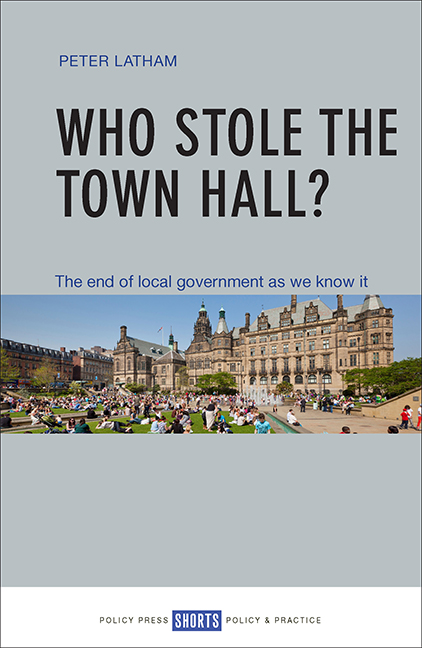Book contents
- Frontmatter
- Dedication
- Contents
- List of tables
- Acknowledgements
- Foreword
- About the author
- List of abbreviations
- Introduction
- 1 The Localism Act, Open Public Services and the neoliberalisation of councils
- 2 Imposed ‘metro’ mayors: new wine in old bottles
- 3 Police and Crime Commissioners: another ‘half-baked import’
- 4 Local government finance
- 5 Towards a new basis for federal, regional and local democracy
- References
- Index
5 - Towards a new basis for federal, regional and local democracy
Published online by Cambridge University Press: 05 April 2022
- Frontmatter
- Dedication
- Contents
- List of tables
- Acknowledgements
- Foreword
- About the author
- List of abbreviations
- Introduction
- 1 The Localism Act, Open Public Services and the neoliberalisation of councils
- 2 Imposed ‘metro’ mayors: new wine in old bottles
- 3 Police and Crime Commissioners: another ‘half-baked import’
- 4 Local government finance
- 5 Towards a new basis for federal, regional and local democracy
- References
- Index
Summary
This final chapter argues that the Marxist approach in political science is still relevant; further deconstructs the European Union dimension; concludes that in order to implement the policy proposals made in Chapters One to Four a new system of federal, regional and local democracy is needed; assesses the current balance of political forces in the UK; and discusses the crisis of working-class political representation and ways in which it is now beginning to be addressed.
The continuing relevance of the Marxist approach in political science
Jonathan Davies, seeking to explain the contradiction between New Labour's ostensible commitment to ‘devolving power’ and its strong centralising/controlling approach to local government, notes that Antonio Gramsci used the term ‘passive revolution’ to refer to ‘a movement seeking to carry out transformation by non-revolutionary means within the confines of capitalism’ (Davies, J.S., 2011, pp 106–7). For example, during the New York fiscal crisis in 1975 a powerful cabal of investment bankers pushed the city into technical bankruptcy and debt payments were funded by wage freezes, cuts in employment and welfare, plus service-user fees. Hence, ‘Powerful economic actors mobilised in the face of a crisis of profitability, increasing competition and declining confidence in the city's ability to pay its debts’ (Davies, J.S., 2011, p 109). Subsequently, other major US cities (including Cleveland in 1978 and Philadelphia in 1991) teetered on the edge of bankruptcy before brokering similar deals. Moreover, Detroit, the biggest US city to take such drastic action, formally filed for bankruptcy in 2013 when it was faced with debts of $18.5 billion (Guardian, 15 July 2013). Davies therefore concludes that
the power structures of capitalist political economy … must be confronted at the point of production, distribution and exchange. The question then is whether it is possible to create a movement capable of doing so spearheaded by the organised working class or some other constellation of forces … the student movement … and its trade union counterpart … form a vital part of the terrain upon which the emancipatory potential and limits of networked resistance will be determined. (Davies, J.S., 2011, p 148)
- Type
- Chapter
- Information
- Who Stole the Town Hall?The End of Local Government as We Know It, pp. 127 - 158Publisher: Bristol University PressPrint publication year: 2017

